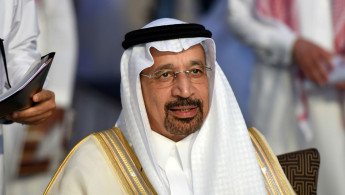Saudi Arabia's energy minister upbeat despite US shale recovery
Saudi Arabia is putting on a brave face as US shale recovery looms, which could override global production caps and threaten to drive oil prices down even further.
2 min read
Khalid al-Falih expressed doubt that US shale will threaten OPEC's global production cut [AFP]
A swift recovery for the US shale oil industry would not be a cause of concern for OPEC, Saudi Arabia's Energy Minister Khalid al-Falih claimed on Thursday, despite the producers attempting to shore up oil prices through global cuts.
The former Saudi Aramco head expressed his scepticism that US shale production would rise substantially in the near future at the World Economic Forum in Davos.
"What has been tapped recently is the most prolific areas," al-Falih said.
He also expressed doubts that the US could add the 2 to 4 million barrels per day [bpd] needed to keep up with demand in the near future.
"As demand rises they will go to the more expensive, more difficult, less prolific areas in the shale and they will find that they need higher prices," he said.
Falih's comments come as global traders and oil executives are eyeing the rate at which the recession-hit US shale industry can recover, with output bouncing back after troughing mid-2016.
This recovery may threaten OPEC's attempt to shore up prices by cutting global production.
Prior to the price crash, the US was able to boost its output by around 1 million bpd between 2011 and 2015, posing a threat to OPEC's member states.
Despite Falih's scepticism over the current US shale recovery, there are other major players seemingly willing to bet on a sustained recovery.
On Tuesday, ExxonMobil announced a $6.6bn deal to purchase 250,000 acres in Texas' Permian shale basin - an area which has stood out as the most prolific shale fields during the crash.
Darren Woods, Exxon's new chief executive said that the new investment could "generate attractive returns in a low-price environment [as] the dominant US growth area for onshore oil production".
According to a report published by the Energy Information Administration on Tuesday, output from the Permian Basin is expected to increase by 53,000 bpd in February.
With Saudi Arabia having agreed to supply cuts with OPEC members and non-OPEC states, the next quarter will prove a real test for the kingdom's resolve in implementing its part of the deal.
Some analysts expect the market to balance by the middle of 2017, consolidating price increases over the last year.
OPEC, whose member states produce roughly 40 percent of the world's crude, is due to meet again in July to review the current production cut.





 Follow the Middle East's top stories in English at The New Arab on Google News
Follow the Middle East's top stories in English at The New Arab on Google News


